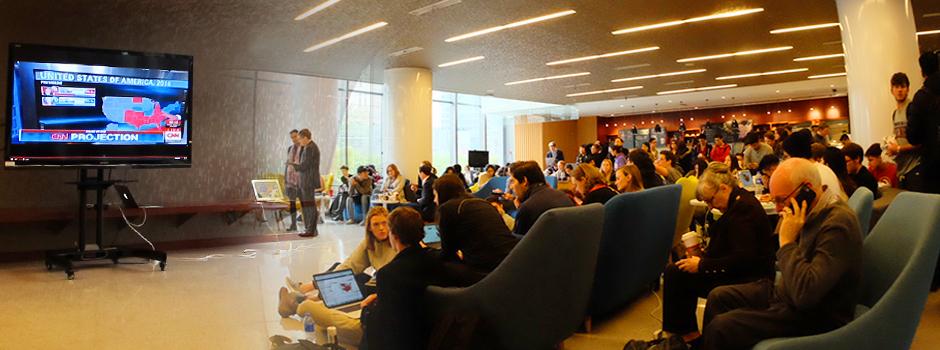Crowding around the TV screens in the second floor Cafe for the US election returns, the NYU Shanghai community watched as Donald Trump, the real estate tycoon, stunned the world by out-polling democratic candidate Hillary Clinton to win the presidency of the United States.
Promptly at 8 a.m. on November 9, students, faculty and leadership members--including Jeffrey Lehman, Joanna Waley-Cohen, Maria Montoya, Rick Hills and Clay Shirky -- trickled into the public area to settle in and catch the real time CNN news coverage of the election results.
Passionate about the campaign from the very beginning, sophomore Shi Yufeng said the gathering provided a direct platform to closely observe reactions of people from different countries to the election, adding that Trump’s stances on education, foreign policy and immigration deeply affect Chinese students.
As the tallies remained locked in major states for hours, the crowd was heard intermittently bursting into a hail of applause when votes from one electoral college were projected in favor of the candidate they supported, and deep sighs when not. Silence hung over the huddled group, with many astonished and weeping, when Trump seized decisive victories in major swing states -- Florida, Ohio and North Carolina.
Vice Chancellor of NYU Shanghai Jeffrey Lehman encouraged the NYU Shanghai community to think positively of the election result, recalling that he voted for the losing candidates in seven of the 11 presidential elections he participated in.
“Each time I was disappointed because I was intellectually and emotionally engaged in the process. However, regardless of who is the president of the United States, we all have to think about how we, in our own lives, not as voters, but as citizens of our own countries, can actively contribute to the production of a better world,” Lehman said.
“What animates our university is a set of cosmopolitan values, centered around the respect for people from different cultures, and the respect expresses itself through commitment and engagement,” he said, adding that America is in greater need for this trait now in many ways than ever.
In addition, several faculty members offered their insight on possible policy shifts during Trump’s administration shortly after his surprising victory.
Maria Montoya, a professor of history and the Dean of Arts and Sciences, suggested that the Trump campaign tapped into the deep rural urban divide in the United States, which also maps onto a cultural split between those who Clinton called the “deplorables” and those who Trump’s supporters see as the cultural elite on the two coasts.
“What we saw was Trump’s supporters reacting to the inevitable demographic change, which has been making and will continue to make the United States a younger, and more ethnically, religiously and racially diverse nation,” she said.
Montoya worried that Trump’s administration might resemble the United States in the late 1930s when “America First” reflected US politicians’ desire to look inward, while pushing policies such as immigration restriction, suppression of radicals, and isolationism.
With regards to foreign policy, Pierre Landry, Professor of Political Science and Director of Global China Studies, said President Trump, however, will definitely not become a dictator as the key players that need to be appointed -- the secretary of state and the secretary of defence are subjected to congressional oversight.
“He has to take into account the political system while generating new policies,” Landry said, noting that Trump might rely on relatively junior or new people serving in key posts since many important players in the Republican party who are active in foreign policy have explicitly refused to support him.


